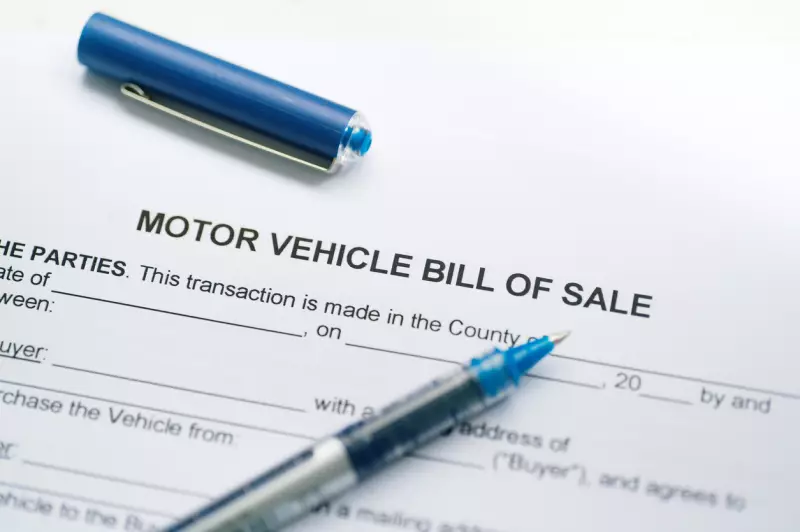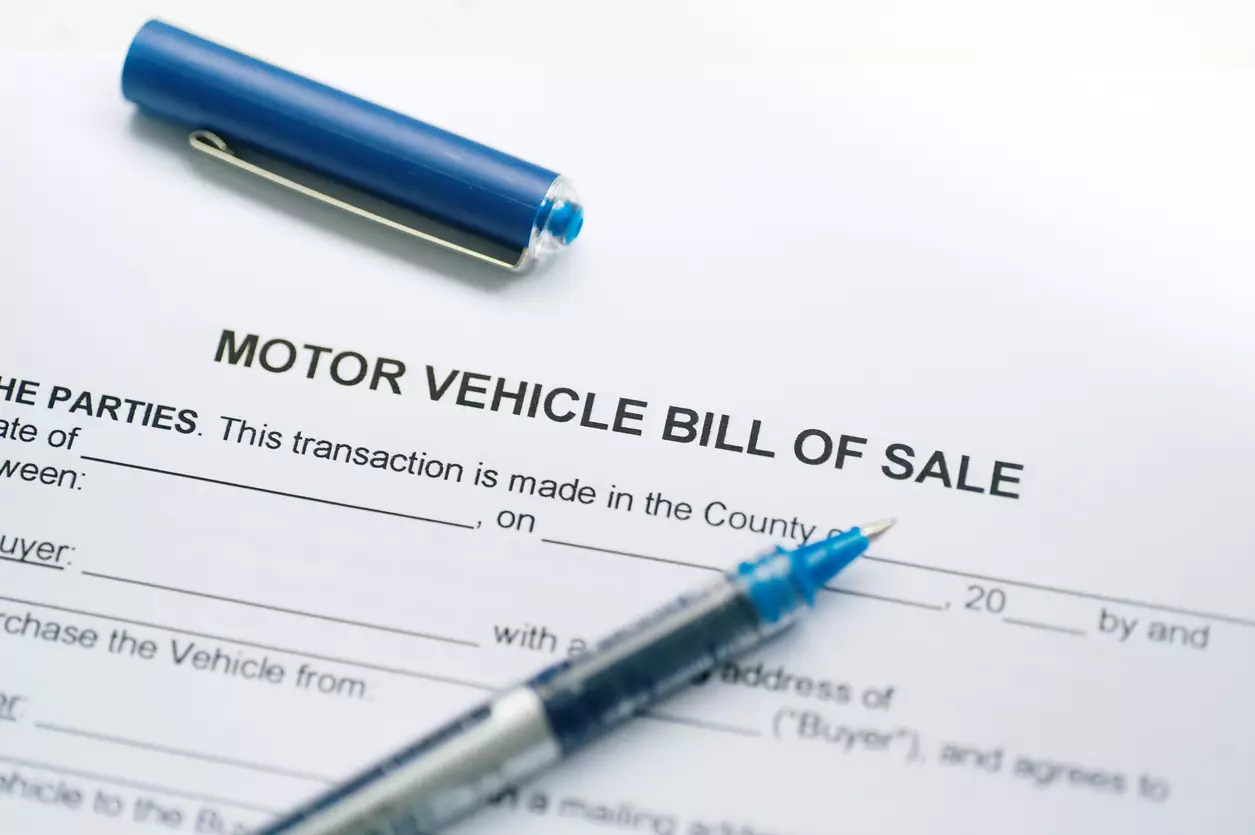A bill of sale is a legal document that records the transfer of ownership from a seller to a buyer. This document serves to formalize the transaction, outlines key terms of the deal, and may also be used as legal proof of the change in ownership. While bills of sale are most commonly associated with cars, they may also be used for any other type of personal property, ranging from boats and machinery to firearms, electronics, and even livestock. Whether you are buying or selling a vehicle, or any other valuable asset, understanding what counts as a bill of sale (and why it matters) can help you make smarter, more secure transactions and also protect you from legal issues down the line.

What Is a Bill of Sale?
A bill of sale is essentially a written agreement showing that one person (or entity) has sold something to another. It typically details key information about the item being sold, the parties involved, the sale price, and the conditions of the transaction. Once the bill of sale has been signed by both parties, it becomes a binding record of the transaction and serves as proof that ownership of the item has legally changed hands.
Purpose of a Bill of Sale
A bill of sale primarily serves as written documentation that ownership of an item has been transferred between two parties and is often used for several purposes, such as:
- Confirming that the buyer is now the legal owner of the property
- Serving as proof of the sale for the seller.
- Providing a record of the agreed-upon terms and conditions of the sale.
- Fulfilling necessary legal requirements, where applicable (some states or jurisdictions may require a bill of sale for vehicle registration, tax filings, or title transfers)
- Providing legal protection to the involved parties in the event of disputes
When It’s Typically Used
A bill of sale is usually the primary legal documentation for many private sales, especially those without a formal invoice or dealer agreement. Examples of transactions where you may come across these documents include:
- Private party sales of cars, motorcycles, boats, trailers, RVs, and other vehicles
- Purchase or sale of livestock or firearms (in jurisdictions where it's permitted and regulated)
- Sale of valuable machinery, tools, and electronics
- Moving items between family members or businesses
It is always a good idea to use a bill of sale for any valuable property-related transaction, even when it is not legally required.
What Information Does a Bill of Sale Include?
For a bill of sale to be considered legally binding, it must be clearly worded, with accurate and complete information. This helps to ensure the transaction is properly documented and that the bill of sale will hold up to scrutiny in legal or administrative processes – a vaguely worded or incomplete bill of sale can lead to misunderstandings and even legal issues.
To this end, a complete bill of sale typically has to include certain necessary details, such as information on the parties involved in the transaction (the buyer and seller), a description of the item, sales and payment terms, and dated signatures.
Buyer and Seller Information
A bill of sale should identify the parties involved in the transaction. As such, it should include the full names of the buyer(s) and seller(s), their current addresses, phone numbers, and any other applicable identifying information. This is important for accountability and follow-ups, especially if registration or taxes are involved.
Description of the Item Sold
The bill of sale should also provide a clear and thorough description of the item being transferred to ensure clarity. For vehicle sales, this should include the car’s make, model and year, VIN, color and body style, odometer reading at the time of the sale (this may be mandatory in some jurisdictions), and its condition, such as whether it’s clean, salvaged, damaged, or sold “as-is.”
Sale Terms and Payment
A bill of sale should clearly outline the agreed-upon terms of the transaction, such as:
- The sale price
- Accepted payment methods (if there is a payment plan or deposit involved, it should also be clearly stated)
- Whether the sale is final or subject to contingencies
- Any warranties provided or special conditions, such as an “as-is” disclaimer if the item is sold without a warranty
Date and Signatures
A valid bill of sale must include the date of the transaction and the signatures of both the buyer(s) and the seller(s). This is a key part of the bill of sale, as it marks the official transfer of ownership. In some cases, especially for vehicle sales or firearms, the document may also need to be notarized to meet state or legal requirements.
Why a Bill of Sale Matters for Legal and Personal Protection
So, do you need a bill of sale for a car or any other personal property? The simple answer to this is “yes.”
A bill of sale is a powerful legal tool, even in casual or private transactions. This document does more than record the purchase – it also offers peace of mind and legal protection to both parties by ensuring that all terms of the sale are clarified and preventing legal disputes after the sale is complete. As such, you should never skip this step when transferring property, regardless of how cumbersome the paperwork may seem.

Proof of Ownership Transfer
The bill of sale establishes exactly when ownership changed hands and clearly shows when the item stopped being the seller’s responsibility and became the buyer’s. This information is essential for documenting the sale for legal or insurance purposes, registering the item with local authorities, and also avoiding future liability on the part of the seller for matters like traffic violations and accidents.
Protection from Liability or Disputes
In situations where a disagreement arises about the sale, whether it’s over payment issues, item condition, or warranties, the bill of sale provides clear evidence of what was agreed upon by both parties, thereby helping to prevent “he said, she said” arguments. This is particularly important for sellers, as it helps protect them against false claims that the item was misrepresented or not delivered by providing documented proof that the buyer accepted the item in its described condition.
Registration and Tax Use
In many states, a bill of sale is required to transfer the title of a car, boat, and other vehicles, calculate and document sales tax owed, and also to register the vehicle with the state’s Department of Motor Vehicles (or any other applicable vehicle registration authority in the jurisdiction). Be aware that some states may have a uniform bill of sale form for these transactions, while others may allow any written document that includes all necessary details.
Types of Bills of Sale
Different transactions call for different bills of sale or formats, and understanding which one to use can help ensure that you comply with legal requirements and protect your interests.
General Bill of Sale
A general bill of sale is a simple, flexible type of bill of sale that may be used for everyday transactions involving personal property, like furniture, electronics, tools, collectibles, or household equipment. This document does not typically require any government agency involvement and usually includes the basics, such as the names of the parties involved, the description and price of the item, and signatures.
Vehicle Bill of Sale
This type of bill of sale is usually designed specifically for car sales and other vehicle-related ownership transfers. As such, it typically includes more detailed information, like the car’s VIN and odometer reading, the buyer(s) and seller(s) IDs, and any other state-required disclosures, like emissions or damage history. Some states provide an official vehicle bill of sale form (through the DMV), which may be combined with title documents or required as a separate document during registration.
As-Is Bill of Sale
An “as-is” bill of sale explicitly states that the item is being sold without any warranties. This protects the seller from responsibility after the sale by making it clear that the buyer is accepting the item in its current condition and that the seller is not making any guarantees about future performance. This type of bill of sale is common for used car sales between private parties.
Absolute vs. Conditional Bill of Sale
An absolute bill of sale is used for transactions where full ownership of the item is transferred to the buyer immediately with no conditions attached, and generally serves as irrevocable proof of the unconditional transfer of ownership of the item. These documents are crucial in blocking the seller from trying to reclaim the item by providing clear proof that the buyer now owns the item free of any hidden debts.
On the other hand, a conditional bill of sale is used for transactions where the ownership of the item is transferred to the buyer only after specific terms are met. Here, the transfer isn’t immediate or final; instead, it depends on conditions like payment completion, inspections, or performance criteria. This type of bill of sale is common in situations where the buyer needs time to verify the item’s condition or the seller needs added protection in case of payment defaults.
A bill of sale is a legally binding document that may seem like a simple piece of paperwork, but actually plays a crucial role in securing and validating personal property transactions. Whether you're buying or selling a car or any other valuable item, using a bill of sale protects your interests by ensuring clarity, compliance with relevant legal requirements, and serving as documented proof of an agreement.




















